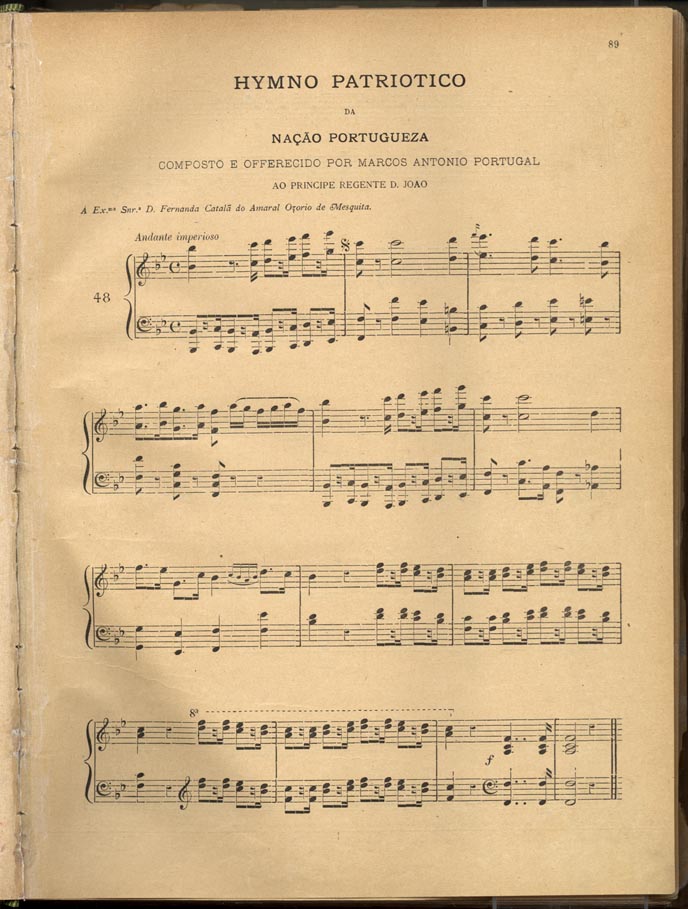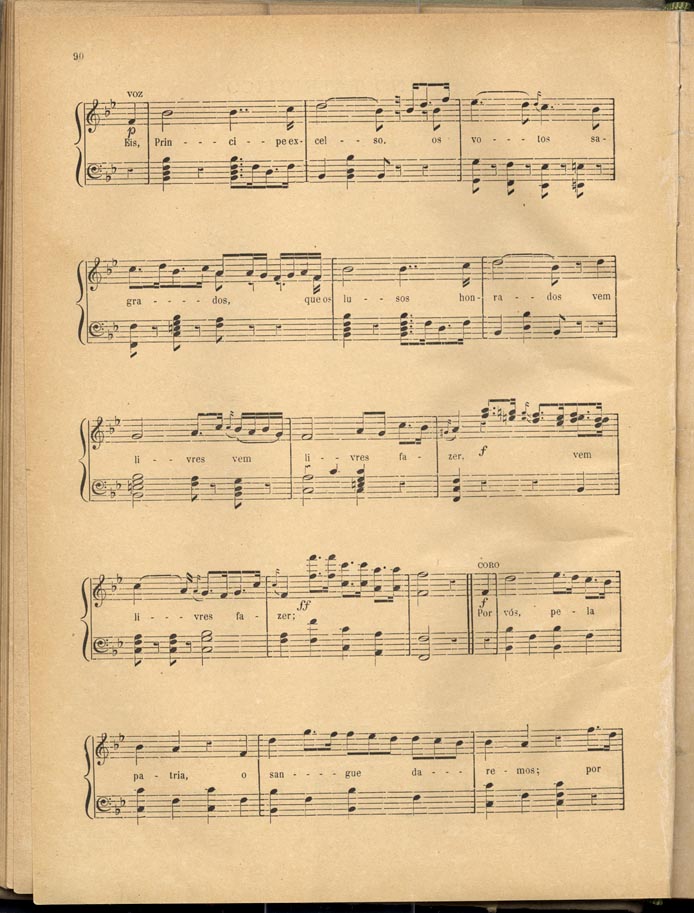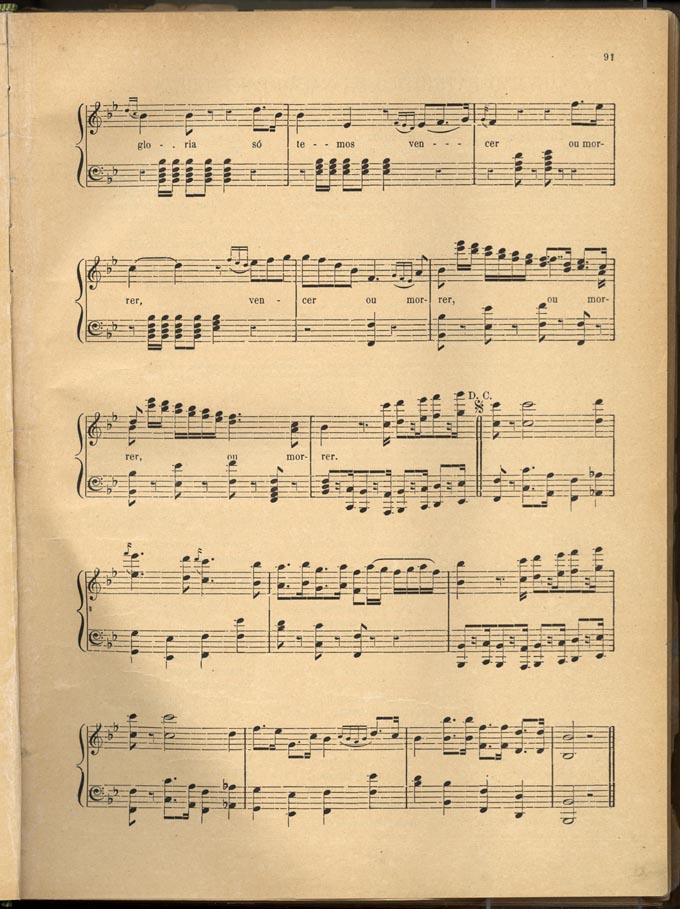| rdfs:comment
| - Die Hymno Patriótico (portugiesisch für: Patriotische Hymne), wird als Portugals erste Nationalhymne angesehen. Das Lied war von der Kantate “La Speranza o sia l’Augurio Felice” beeinflusst. Bis 1821 änderte sich der Text mehrmals. Nachdem Peter I. den Thron bestieg, wurde das Lied “Hymno da Carta” populärer und 1834 offiziell als Hymne angenommen. (de)
- ( 다른 뜻에 대해서는 애국가 문서를 참고하십시오.) 애국가(포르투갈어: Hino Patriótico 이누 파트리오티쿠[*])는 1809년부터 1834년까지 사용된 포르투갈 왕국의 첫 번째 국가이다. 이 제작했다. 후에는 헌장 찬가가 사용되었다. (ko)
- The Hymno Patriótico (English: "Patriotic Hymn") was considered Portugal’s first national anthem. Marcos Portugal, who had remained living in Portugal, had, in 1808, initially named the piece as ‘the Prince’s Hymn’ (D. João VI Hymn). With this dedication, it was offered to the Prince Regent D. John and first performed for him in Brazil in 1809. The anthem was inspired by the cantata "La Speranza o sia l’Augurio Felice". The lyrics changed several times, altered by contemporary events, until settling into a more or less permanent form in 1821. (en)
- L'Hymne patriotique (en espagnol : « Hymno Patriótico » ou en portugais : « Hino Patriótico ») est considéré comme le premier hymne national du Portugal. En 1808, Marcos Portugal avait initialement nommé le morceau Hymne du Prince (hymne de D. João VI). Avec cette dédicace, il fut offert au prince régent Jean VI de Portugal et joué pour la première fois pour lui au Brésil en 1809. L'hymne a été inspiré par la cantate La Speranza o sia l'Augurio Felice. Les paroles ont changé plusieurs fois, altérées par les événements contemporains, jusqu'à s'installer dans une forme plus ou moins permanente en 1821. (fr)
- O Hino Patriótico, ou na sua grafia original Hymno Patriotico (forma completa Hymno Patriotico da Nação Portugueza), pode ser considerado o primeiro hino oficial de Portugal. Composto em 1808 por Marcos Portugal e dedicado ao Príncipe Regente D. João VI foi inspirado no final da cantata La Speranza o sia l`Augurio Felice do mesmo autor. A data da sua oficialização enquanto hino nacional é incerta, sendo apontado o primeiro quartel do século XIX. Foi posteriormente substituído na sua função pelo Hino da Carta composto pelo Rei D. Pedro IV (que foi também Imperador D. Pedro I do Brasil). (pt)
- 愛國歌(葡萄牙語:Hino Patriótico/Hymno Patriótico,全稱為Hymno Patriotico da Nação Portugueza)被認為是葡萄牙的第一首被官方認定的國歌。其作者為葡萄牙古典音樂家,在1808年創作的歌。《愛國歌》最初的名字為《約翰六世的讚美詩》(葡萄牙語:D. João VI Hymn)這首歌原本只是獻給葡萄牙國王約翰六世的一首頌歌,而當時的約翰六世只是葡萄牙的攝政王。這首歌於被創作的隔年(1809年)在巴西演出。這首歌的靈感來自一個清唱劇"La Speranza o sia l’Augurio Felice"。這首歌的歌詞一直隨著當時的事件而改變,直到1821年其歌詞才被永久保存。 愛國歌在威靈頓公爵所率領的葡萄牙半島軍隊中十分流行。而威靈頓公爵麾下的英國陸軍法務司司長(Seymour Larpent)在他1813年6月9日時所寫的日記中提到: (zh)
|
| has abstract
| - Die Hymno Patriótico (portugiesisch für: Patriotische Hymne), wird als Portugals erste Nationalhymne angesehen. Das Lied war von der Kantate “La Speranza o sia l’Augurio Felice” beeinflusst. Bis 1821 änderte sich der Text mehrmals. Nachdem Peter I. den Thron bestieg, wurde das Lied “Hymno da Carta” populärer und 1834 offiziell als Hymne angenommen. (de)
- The Hymno Patriótico (English: "Patriotic Hymn") was considered Portugal’s first national anthem. Marcos Portugal, who had remained living in Portugal, had, in 1808, initially named the piece as ‘the Prince’s Hymn’ (D. João VI Hymn). With this dedication, it was offered to the Prince Regent D. John and first performed for him in Brazil in 1809. The anthem was inspired by the cantata "La Speranza o sia l’Augurio Felice". The lyrics changed several times, altered by contemporary events, until settling into a more or less permanent form in 1821. It was a particularly popular tune with the Portuguese troops of Wellington's Peninsular Army, where it was known by the words from the chorus Vencer ou morrer ("Win or die"). Wellington's Advocate General, Seymour Larpent, noted in his diary on 9 June 1813, "The Portuguese are in the highest order, the men really look at least equal to ours, better than some … the infantry and the Caçadores in particular. The whole army marches very fresh hitherto, but the Portuguese in particular; they come in, even to the last mile, singing along the road." "I have heard it boldly played in the teeth of the enemy by the Portuguese bands … It made all Portuguese hearts pant for the fight … and as the voices joined the music, Vencer o morir [Vencer ou morrer] was not sung without meaning." After D. Peter of Braganza became king and provided a new constitution, the song "Hymno da Carta" became more commonly used as the anthem, and the latter was officially decreed as such in 1834. (en)
- L'Hymne patriotique (en espagnol : « Hymno Patriótico » ou en portugais : « Hino Patriótico ») est considéré comme le premier hymne national du Portugal. En 1808, Marcos Portugal avait initialement nommé le morceau Hymne du Prince (hymne de D. João VI). Avec cette dédicace, il fut offert au prince régent Jean VI de Portugal et joué pour la première fois pour lui au Brésil en 1809. L'hymne a été inspiré par la cantate La Speranza o sia l'Augurio Felice. Les paroles ont changé plusieurs fois, altérées par les événements contemporains, jusqu'à s'installer dans une forme plus ou moins permanente en 1821. C'était un air particulièrement populaire auprès des troupes portugaises de l'armée péninsulaire d'Arthur Wellesley de Wellington durant la guerre d'indépendance espagnole de 1808, où il était connu par les paroles du chœur Vencer ou morrer . L'avocat général de Wellington, (en), écrit dans son journal du 9 juin 1813 : « Les Portugais sont dans l'ordre le plus élevé, les hommes semblent vraiment au moins égaux aux nôtres, meilleurs que certains… l'infanterie et les Caçadores en particulier. Toute l'armée marche très frais jusqu'à présent, mais les Portugais en particulier ; ils arrivent, même jusqu'au dernier kilomètre, en chantant le long de la route. » Il poursuit : « Je l'ai entendu jouer hardiment dans les dents de l'ennemi par les fanfares portugaises… Il a fait haleter tous les cœurs portugais pour le combat… et comme les voix se joignaient à la musique, Vencer o morir [Vencer ou morrer] n'était pas chanté sans signification. » Après l'accession au trône de Pierre IV de Portugal et la mise en place d'une nouvelle constitution, l'Hymne de la Charte est devenue plus couramment utilisée comme hymne. Cette dernière a d'ailleurs été officiellement décrétée comme hymne national en 1834. (fr)
- ( 다른 뜻에 대해서는 애국가 문서를 참고하십시오.) 애국가(포르투갈어: Hino Patriótico 이누 파트리오티쿠[*])는 1809년부터 1834년까지 사용된 포르투갈 왕국의 첫 번째 국가이다. 이 제작했다. 후에는 헌장 찬가가 사용되었다. (ko)
- O Hino Patriótico, ou na sua grafia original Hymno Patriotico (forma completa Hymno Patriotico da Nação Portugueza), pode ser considerado o primeiro hino oficial de Portugal. Composto em 1808 por Marcos Portugal e dedicado ao Príncipe Regente D. João VI foi inspirado no final da cantata La Speranza o sia l`Augurio Felice do mesmo autor. A data da sua oficialização enquanto hino nacional é incerta, sendo apontado o primeiro quartel do século XIX. Foi posteriormente substituído na sua função pelo Hino da Carta composto pelo Rei D. Pedro IV (que foi também Imperador D. Pedro I do Brasil). A letra sofreu várias mutações, sendo originalmente destinada ao Príncipe Regente começava com a frase "Oh Príncipe Excelso…". A primeira estrofe do hino já após a subida de D. João VI ao trono é a seguinte:Eis, oh Rei Excelso Os votos sagrados Q'os Lusos honrados Vêm livres, vêm livres fazerVêm livres fazer Por vós, pela PátriaO sangue daremosPor glória só temosVencer ou morrerVencer ou morrerOu morrerOu morrer (pt)
- 愛國歌(葡萄牙語:Hino Patriótico/Hymno Patriótico,全稱為Hymno Patriotico da Nação Portugueza)被認為是葡萄牙的第一首被官方認定的國歌。其作者為葡萄牙古典音樂家,在1808年創作的歌。《愛國歌》最初的名字為《約翰六世的讚美詩》(葡萄牙語:D. João VI Hymn)這首歌原本只是獻給葡萄牙國王約翰六世的一首頌歌,而當時的約翰六世只是葡萄牙的攝政王。這首歌於被創作的隔年(1809年)在巴西演出。這首歌的靈感來自一個清唱劇"La Speranza o sia l’Augurio Felice"。這首歌的歌詞一直隨著當時的事件而改變,直到1821年其歌詞才被永久保存。 這首歌在威靈頓率領的半島葡萄牙軍隊中十分流行。而合唱團 Vencer ou morrer 的歌詞也得聞名。Hymno Patriótico(英語:“Patriotic Hymn”)被認為是葡萄牙的第一首國歌。 1808 年,留在葡萄牙的馬科斯·葡萄牙最初將這首作品命名為“王子的讚美詩”(D. João VI Hymn)。憑藉這種奉獻精神,它被提供給攝政王 D. John,並於 1809 年在巴西首次為他演出。國歌的靈感來自康塔塔“La Speranza o sia l’Augurio Felice”。歌詞多次更改,因當代事件而改變,直到 1821 年或多或少地成為一種永久形式。 愛國歌在威靈頓公爵所率領的葡萄牙半島軍隊中十分流行。而威靈頓公爵麾下的英國陸軍法務司司長(Seymour Larpent)在他1813年6月9日時所寫的日記中提到: 已隱藏部分未翻譯内容,歡迎參與翻譯。“The Portuguese are in the highest order, the men really look at least equal to ours, better than some … the infantry and the Caçadores in particular. The whole army marches very fresh hitherto, but the Portuguese in particular; they come in, even to the last mile, singing along the road." "I have heard it boldly played in the teeth of the enemy by the Portuguese bands … It made all Portuguese hearts pant for the fight … and as the voices joined the music, Vencer o morir Vencer ou morrer was not sung without meaning.”(英文) (zh)
|

![http://dbpedia.demo.openlinksw.com/c/A3o5xbAnMo]()



![[RDF Data]](/fct/images/sw-rdf-blue.png)



![[RDF Data]](/fct/images/sw-rdf-blue.png)





![[cxml]](/fct/images/cxml_doc.png)
![[csv]](/fct/images/csv_doc.png)
![[text]](/fct/images/ntriples_doc.png)
![[turtle]](/fct/images/n3turtle_doc.png)
![[ld+json]](/fct/images/jsonld_doc.png)
![[rdf+json]](/fct/images/json_doc.png)
![[rdf+xml]](/fct/images/xml_doc.png)
![[atom+xml]](/fct/images/atom_doc.png)
![[html]](/fct/images/html_doc.png)